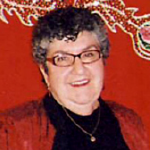
The following story was written by Liz Lippa and shared as part of the Memory Project.
The past is always elusive. Shakespeare said, “Thus memory doth make liars of us all.” I wanted my own reality check on my own past, a past that was over sixty years old. My four daughters wanted to come with me, and that was far beyond my wildest dreams. It takes two days to fly from St. Louis to Montevideo, Uruguay. It truly feels as if it is a world away.
We spent two weeks in Uruguay, and only two days in Montevideo. The inner city where I lived is not as much changed as I had expected. I found the store where my parents had their business, and it is now a pharmacy. The facade of the store now has the open spaces glassed in, but it looks essentially as it did when it was our grocery store. The building, which is a six-story apartment house, also looks very much the same.
I easily found the school I attended, and it is also virtually unaltered. The house we lived in has been torn down, and the space is now inhabited by homeless people. This, the one great disappointment, was very sad for me to see. I was kept from stepping into the space, afraid to disturb them.
I recaptured tastes like dulce de leche, a wonderful sauce of boiled milk and sugar; faina, a baked corn meal massa with a crisp crust; molasses candy wrapped in a corn husk; and yerba mate, which is a tea the natives drink out of a gourd, sucking it through a silver straw.
I revisited the parks I played in as a little girl, and recognized familiar landmarks, such as statues and fountains. No sad memories surfaced from deep inside, and I felt wonderment at my recollecting them so well. My daughters loved the stories that arose from all these familiar memory triggers. We all commented often on the kindness and friendliness of the people.
Although they very simply dressed and wore little make up, they are clean and well groomed. We never experienced a dirty restaurant, and all the bathrooms were clean and supplied with toilet paper and soap to wash our hands.
We were greeted when we walked into an establishment, and they said “Good bye” and wished us a “Good day” when we left. They were patient and helpful with our lack of Spanish, and we usually were able to get what we wanted.
We noticed and loved the way they greeted each other with a kiss, even men to men, and the way they treated their children. We never saw or heard them yell at each other or the children, and the kids were well behaved.
And so, the very best thing I learned about my early childhood is that, in my most formative years, I was among good, kind people who probably treated me well and were good role models in relationships. They had good manners and sanitary personal habits. That was the greatest gift Uruguay gave me, and it was an unexpected bonus.
I want to believe that I carry those qualities and that I have passed them on to my own children. Every one of them makes a living doing work that requires very good people-skills, and they are quite successful in their jobs. I have often noticed this, and now I have another clue about one of the ways these qualities were passed onto me. My parents held these values, and it appears that the people we lived among reinforced them. I also hope that these kind people made my parents’ difficult transition a little easier.
Ultimately, it is people who make the difference.
(May 2007)

